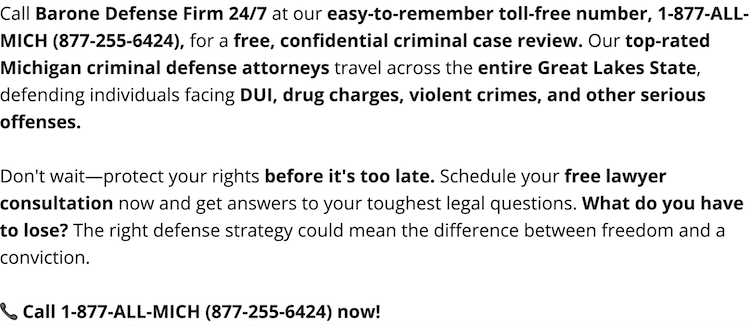State of Michigan Vs. R.L.
Court: 35th District Court – Plymouth, Michigan
Charge: Non-Jury Trial
In this case the Client's had stopped for a few beers after work. He left the bar and was driving Northbound on I-275 when he was spotted by a State Trooper. The Trooper followed for a period of time, then stopped the Client, ostensibly because he was not wearing his seat belt.
Upon contacting the Client, the Trooper noted that there was a moderate smell of intoxicants, and that his speech was slurred as he spoke. The trooper ordered him out of the vehicle and asked him to perform several field sobriety "tests". At trial the Trooper testified that the Client could not follow his directions, and "failed" the finger touch test. The Trooper also testified that he did not properly pick a number between 11 and 13, but instead picked "9". The client was then given the preliminary breath test with the result of .176. The client was arrested and transported to the Livonia Police Department for processing. The Trooper testified that after observing the mandatory 15 minute observation period at the Livonia Police Station the Client was given an evidentiary breath test on the Datamaster, and the results were .17 and .17. The evidence ticket showing these results was admitted into evidence. This ticket also indicated a start observation time of 18:43, and a first subject sample at 19:04.
On cross-examination the Trooper admitted that the evaluation of the finger count was "fairly subjective" and that his department had not prepared a standardized method to evaluate this field sobriety test. The Trooper testified further that he did not attempt to score the Client's performance, but instead simply concluded that the Client had not followed his instructions. The Trooper also testified that the Student Manual prepared by the NHTSA was authoritative. Having done so, and without further questioning, the Judge acknowledged that the field sobriety tests given were not the most probative tests available.
Regarding the breath test it was established that the 15 minute observation period was not followed. This was accomplished in the following way: All of the documentary evidence was carefully examined by our office. Upon doing so it was determined that there was insufficient time to allow the 15 minute observation period. To prove this at trial it was necessary to obtain the dispatch records of the State Police as well as the City of Livonia. Therefore a pretrial discovery order was obtained from the Court and served on the respective departments. However, only the City of Livonia complied. The next step was to determine how to cross-examine the Trooper to obtain the necessary times but not give him enough clues based on the questions to guess that the 15 minute observation period was being contested. If this could be done then the Prosecutor and the Trooper would be caught off guard and unprepared.
It was first established that the necessary chemical test rights were read to the Client at the scene of the arrest. It was next established that there was a distance of about five miles and between a five and fifteen minute drive between the scene of arrest and the Livonia Police Department. The Trooper also testified that after he read these rights to the Client he waited for the tow truck to arrive. Finally it was established that the chemical test rights were read at 18:42.
Our closing argument was that there was insufficient observation evidence of either OUIL or the lesser OWI, and that the breath test results should not be considered by the Court because the lack of a 15 minute observation period made them unreliable. Despite the Trooper's testimony that he had observed the Client for 15 minutes, the evidence showed that this was not possible since the chemical rights were read at the scene (I-275 & 96) and it was at least a 10 minute drive back to the Livonia Police Department. Also, that the Trooper did not leave immediately, instead waiting for the tow truck. The Court was also asked to conclude that since the State Police did not produce the dispatch records pursuant to Court Order, the case should either be dismissed, or the Client was entitled to an inference that they contained information unfavorable to the Prosecutor.
After listening to closing arguments of both parties, the Judge dismissed the case. The Judge indicated in his findings of fact that there was insufficient evidence that a 15 minute observation period was followed. He also found that the Prosecutor had otherwise failed to prove his case.
 Barone Defense Firm Home
Barone Defense Firm Home




















